|
|
|
|
|
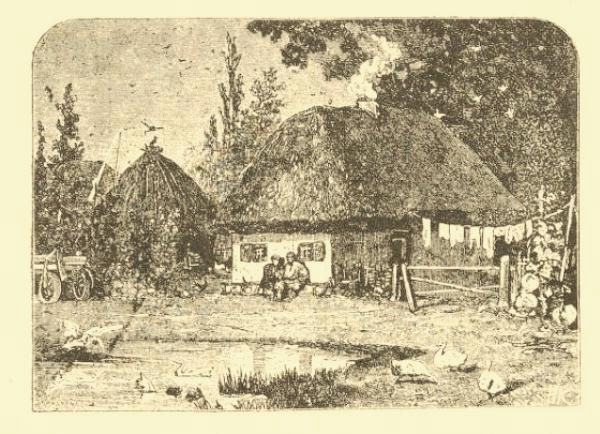
|
Taras Shevchenko
NAIMECHKA OR THE SERVANT
("U nedilyu vrantsi-rano
Pole vkrylosya tumanom..." /
"У неділю вранці-рано
Поле вкрилося туманом...")
Translated by Alexander Jardine Hunter
Prologue
On a Sunday, very early,
When fields were clad with mist
A woman's form was bending
’Mid graves by cloud wreaths kissed.
Something to her heart she pressed,
In accents low the clouds addressed.
“Oh, you mist and raindrops fine,
Pity this ragged luck of mine.
Hide me here in grassy meadows,
Bury me beneath thy shadows.
Why must J ’mid sorrows stray?
Pray take them with my life away.
In gloomy death would be relief,
Where none might know or see my grief.
Yet not alone my life was spent,
A father and mother my sin lament.
Nor vet alone is my course to run
For in my arms is my little son.
Shall J, then, give to him Christian name,
To poverty bind, with his mother's shame?
This, brother mist, I shall not do.
J alone my fault must rue.
Thee, sweet son, shall strangers christen.
Thy mother's eyes with teardrops glisten.
Thy very name I may not know
As on through life I lonely go.
J, by my sin, rich fortune lost.
With thee, my son, to ill fate, was tossed.
Yet curse me not,
for evils past.
My prayers to heaven
shall reach at last.
The skies above
to my tears shall bend.
Another fortune to thee I'll send.
'Through the fields she sobbing went.
The gentle mist
its shelter lent.
Her tears were falling
the path along.
As she softly sang
the widows song:
“Oh, in the field there is a grave
"Where the shining grasses wave:
There the widow walked apart.
Bitter sorrow in her heart.
Poison herbs in vain she sought,
Whereby evil spells are wrought -
Two little sons
in arms she bore
Wrapped around in
dress she wore;
Her children to the river carried,
Jn converse with the water tarried;
"Oh, river Dunai, gentle river,
I my sons to thee deliver.
Thou'lt swaddle them
and wrap them,
Thy little waves
will lap them,
The yellow sands
will cherish them.
Thy flowing waters
nourish them."
|
|

|
I
All by themselves lived
an old couple fond
In a nice little grove
just by a millpond.
Like birds of a feather
Just always together,
From childhood the two of them
fed sheep together,
Lot married, got wealthy,
got houses and lands,
Got a beautiful garden
just where the mill stands.
An apiary full
of behives like boulders.
Yet no children were theirs,
and death at their shoulders.
Who will cheer their passing years?
Who will soothe their mortal fears?
Who will guard their gathered treasure
In loyal service find his pleasure?
Who will be their faithful son
When low their sands of life do run?
Hard it is a child to rear,
In roofless house ‘mid want and fear.
Yet just as hard ‘mid gathered wealth,
When death creeps on with crafty stealth,
And one's treasures good
At end of life's wandering.
Are for strangers rude
For mocking and squandering.
|
|
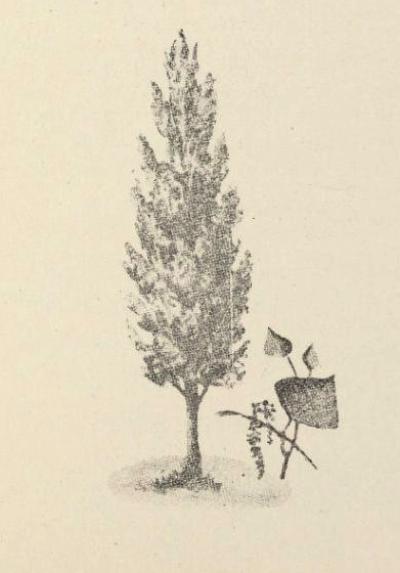
|
II
One fine Sunday,
in the bright sunlight;
All dressed up
in blouses white.
The old folks sat
on the bench by the door;
No cloud in sky,
What could they ask more?
All peace and love
it seemed like Eden.
Yet angels above
their hearts might read in,
A hidden sorrow,
a gloomy mood
Like lurking beast
in darksome wood.
In such a heaven
Oh, do you see
Whatever could
the trouble be?
I wonder now
what ancient sorrow
Suddenly sprang
into their morrow.
Was it quarrel
of vesterdav
Choked off, then
revived today,
Or yet some newly sprouted ire
Arisen to set their heaven on fire?
Perchance they’re called to go to God
Nor longer dwell on earth’s green sod.
Then who for them on that far way
Horses and chariot shall array?
“Anastasia, wife of mine.
Soon will come our fatal day,
Who will lay our bones away?”
“God only knows.
With me always was that thought
Which gloom into my heart has brought.
Together in years and failing health.
For what have we gathered
all this wealth?”
“Hold a minute.
Hearest thou? Something cries
Beyond the gate - ’tis like a child.
Let’s run! See’st ought?
I thought something was there.”
Together they sprang
And to the gate running;
Then stopped in silence wondering.
Before the stile
a swaddled child.
Not bound tightly,
just wrapped lightly,
For it was
in summer mild,
And the mother
with fond caress
Had covered it
with her own last dress
In wondering prayer
stood our fond old pair.
The little thing
just seemed to plead.
In little arms
stretched out you'ld read
Its prayer, —
in silence all.
No crying — just a little breath its call.
“See, 'Stasia!
What did I tell thee?
Here is fortune and fate for us:
No longer dwell we in loneliness.
Take it
and dress it.
Look at it!
Bless it!
Quick, bear it inside.
To the village I'll ride.
Its ours to baptize,
God-parents we need for our prize.”
In this world
things strangely run.
There’s a fellow
that curses his son,
Chases him away from home,
Into lonely lands to roam.
While other poor creatures,
With sorrowful features,
With sweat of their toiling
Must much money earn;
The wage of their moiling
Candles to burn.
Prayers to repeat,
The saints to entreat;
For children are none.
This world is no fun
The way things run.
|
|
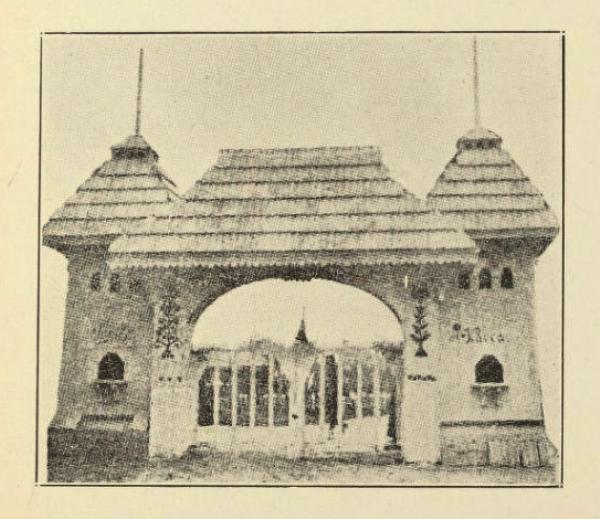
|
III
Their joys do now such numbers reach
God fathers and mothers
’Mid lots of otliers
Behold they hâve gathered
Three pairs of each.
At even they christen him,
And Mark is the name of him.
So Mark grows,
And so it goes.
For the dear old folk it is no joke,
For they don't know where to go.
Where to set him, when to pet him.
But the year goes and still Mark grows.
Yet they care for him, you’d scarce tell how.
Just as he were a good milk-cow.
And now a woman young and bright,
With eyebrows dark and skin so white,
Comes into this blessed place,
For servant's task she asks with grace.
“What, what —
say wee'll take her 'Stasia.”
“We'll take her, Trophimus.
We are old and little wearies us;
He's almost grown within a year,
But yet he'll need more care, I fear.”
“Truly he’ll need care,
And now, praise God, I’ve done my share
My knees are failing, so now
You poor thing, tell us your wage,
It is by the year or how?”
“What ever you like to give.”
“No, no, it's needful to know,
It’s needful, my daughter,
to count one’s wage.
This you must learn, count what you earn.
This is the proverb —
Who counts not his money
Hasn't got any.
But, child, how will this do?
You don't know us,
We don't know you.
You'll star with us a few days.
Get acquainted with our ways;
We’ll see you day by day,
Bye and bye we’ll talk of pay.
Is it so, daughter?”
“Very good, uncle.”
“We invite you into the house.”
And so they to agreement came.
The young woman seemed always the same,
Cheerful and happy as she’d married a lord
Who’d buy up villages just at her word.
She in the house and out doth work
From morning light to evening’s mirk.
And yet the child is her special care;
Whatever befalls, she’s the mother there.
Nor Monday nor Sunday this mother misses
To give its bath and its white dresses.
She plays and sings, makes
waggons and things,
And on a holiday, plays
with it all the day.
Wondering, the old folks gaze,
But to God they give the praise.
So the servant never rests,
But the night her spirit tests.
In her chamber then, I ween,
Many a tear she sheds unseen.
Yet none knows nor sees it all
But the little Mark so small.
Nor knows he why in hours of night
His tossings break her slumbers light.
So from her couch she quickly leaps,
The coverings o'er his limbs she keeps.
With sign of cross the child she blesses,
Her gentle care her love confesses.
Each morning Mark spreads out his hands
To the Servant as she stands;
Accepts, unknowing, a mother’s care.
Only to grow is his affair.
|
|
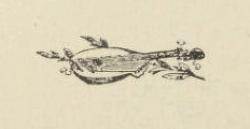
|
IV
Meantime many a year has rolled,
Many waters to the sea have flowed,
Trouble to the home has come,
Many a tear down the cheek has run.
Poor old ’Stasia in earth they laid.
Hardly old Trophim’ from death they saved.
The cursed trouble roared so loud,
And then it went to sleep, I trow.
From the dark woods where she frightened lay
Peace came back in the home to stay.
The little Mark is farmer now.
With ox-teams great in the fall must go
To far Crimea to barter there
Skins for salt and goods more rare.
The Servant and Trophimus
in counsel wise
Plans for his marriage
now devise.
Dared she her thoughts utter
For the Czar’s daughter
She’d send in a trice.
But the most she could say•
While thinking this way
Was, "Ask Mark’s advice.”
“My daughter, we’ll ask him.
And then we’ll affiance him.”
So they gave him sage advice,
And they made decision nice.
Soon his grave friends about him stand.
He sends them to woo, a stately band.
Back they come with towels on shoulder
Ere the day is many hours older.
The sacred bread they have exchanged,
The bargain now is all arranged.
They’ve found a maiden in noble dress,
A princess true, you well may guess
Such a queen is in this affiance
As with a general might make alliance.
“Hail, and well done,” the old man says.
And now let's have no more delays.
When the marriage, where the priest.
What about the wedding feast?
Who shall take the mother's place?
How we'll miss my 'Stasia’s face.”
The tears along his cheeks do fall,
Yet a word does the Servant's heart appall.
Hastily rushing from the room,
In chamber near she falls in swoon.
The house is silent, the light is dim,
The sorrowing Servant thinks of him
And whispers: “Mother, mother, mother.”
|
|
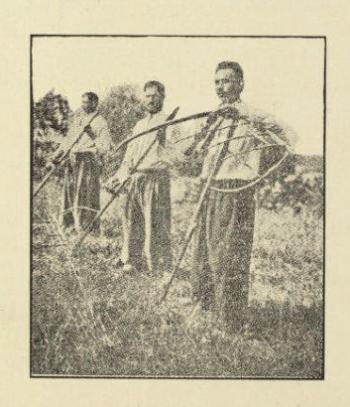
|
V
All the week at the wedding cake
Young women in crowds both mix bake.
The old man is in wondrous glee,
With all the young women dances he.
At sweeping the yard
He labors hard.
All passers-by on foot and horseback
He hales to the court where is no lack
Of good home-brew.
All comers he asks to the marriage
And yet ’tis true
He runs around so
You’d not guess from his carriage
Though his joy is such a wonderful gift,
His old legs are 'most too heavy to lift.
Everywhere is disorder and laughter
Within the house and in the yard.
From store-room keg upon keg follows after,
Workers’ voices everywhere heard.
They bake, they boil,
At sweeping toil,
Tables and floors they wash them all.
And where is the Servant
who cares not for wage?
To Kiev she is gone
on pilgrimage.
Yes, Anna went. The old man pled,
Mark almost wept for her to stay,
As mother sit, to see him wed.
Her call of duty elsewhere lay.
“No, Mark, such honor must I not take
To sit while you your homage make
To parents dear.
My mind is clear.
A servant must not thy mother be
Lest wealthy guests may laugh at thee.
Now may God’s mercy with thee stay,
To the saints at Kiev I go to pray.
But yet again shall I return
Unto your house, if you do not spurn
My strength and toil.”
With pure heart
she blessed her Mark
And weeping, passed
beyond the gate.
Then the wedding blossomed out;
Work for musicians and the joyous rout
Of dancing feet;
While mead so sweet
Of fermented honey with spices dashed
Over the benches and tables splashed,
Meanwhile the Servant limps along
Hastening on the weary road to Kiev.
To the city come, she does not rest,
Hires to a woman of the town;
For wages carries water.
You see she money, money needs
For prayers to Holy Barbara.
She water carries, never tarries,
And mighty store of pennies saves,
Then in the Lavra’s awesome caves
She seeks the blessed wealth she craves.
From St. John she buys a magic cap.
For Mark she bears it;
And when he wears it,
For never a headache need he give e’er a rap.
And then St. Barbara gives her a ring,
To her new daughter back to bring.
’Fore all the saints
she makes prostrations.
Then home returns
having paid her oblations.
She has come back.
Fair Kate with Mark makes
haste to meet her,
Far beyond the gate they greet her,
Then into the house they bring her,
Draw her to the table there
Quickly spread with choicest fare.
Her news of Kiev they now request,
While Kate arranges her couch for rest.
“Why do they love me.
Why this respect?
Dear God above me,
Do they suspect?
Nay, that’s not so,
’Tis just goodness, I know.”
And still the Servant her secret kept,
Vet from the hurt of her penance wept.
|
|
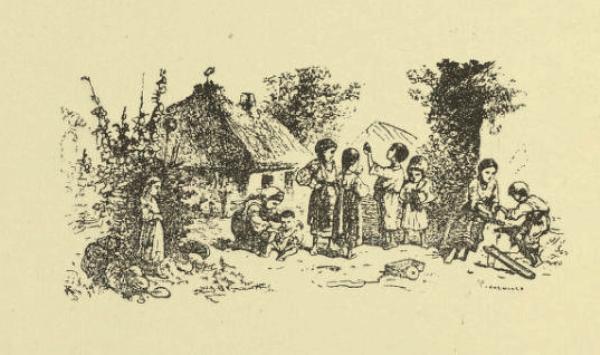
|
VI
Three times have the waters frozen
Thrice thawed at the touch of spring
Three times did the Servant
From Kiev her store of blessings bring.
And each time gentle Katherine,
As daughter, set her on her way,
A fourth time led her by the mounds
Where many dear departed lay.
Then prayed to God for her safe return
For whom in absence her heart would yearn.
It was the Sunday of the Virgin,
Old Trophimus sat in garments white,
On the bench, in wide straw hat,
All amid the sunshine bright.
Before him with a little dog
His frolicsome grandson played,
The while his little granddaughter
Was in her mother’s garb arrayed.
Smiling he welcomed her as matron;
For so at “visitors” they played.
“But what did you do with
the visitor's cake?
Did somebody steal it in the wood,
Or perhaps you've simply
forgotten to bake?"
For so they talked in lightsome mood.
But see, — Who comes?
’Tis their Anna at the door!
Run old and young! Who'll come before?
But Anna waits not their welcome wordy.
“Is Mark at home, or still on journey?"
“He’s off on journey long enough,"
Says the old man in accents gruff.
With pain the Servant sadly saith,
“Home have I come with failing breath;
Nor ’mid strangers would I wait for death.
May I but live my Mark to see,
For something grievously weighs on me."
From little bag the children’s gifts
She takes. There’s crosses and amulets.
For Irene is of beads a string,
And pictures too, and for Karpon
A nightingale to sweetly sing.
Toy horses and a wagon.
A fourth time she brings a ring
From St. Barbara to Katherine.
Next the old man’s gift she handles,
It’s just three holy waxen candles.
For Mark and herself
she nothing brought;
For want of money
she nothing bought.
For want of strength
more funds to earn,
Half a bun was her wealth
on her return.
As to how to divide it
Let the babes decide it.
|
|
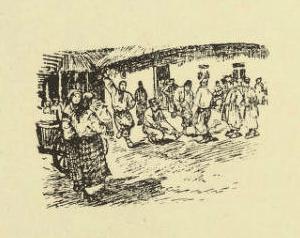
|
VII
She enters now the house so sweet,
And daughter Katherine bathes her feet
Then sets her down to dine in state.
But my Anna nor drank nor ate.
“Katherine!
When is our Sunday?”
“After tomorrow’s the day.”
“Prayers for the dead soon will we need
Such as St. Nicholas may heed.
Then we must an offering pay,
For Mark tarries on the way.
Perchance somewhere,
from our vision hid,
Sickness has ta'en him
which God forbid.”
The tears dropped down
from the sad old eyes,
So wearily did she
from the table rise.
“Katherina,
My race is run,
All my earthly tasks are done.
My powers no longer I command
Nor on my feet have strength to stand.
And yet, my Kate, how can I die
While in this dear warm home I lie?”
The sickness harder grows amain,
For her the sacred host’s appointed,
She’s been with holy oils anointed,
Yet nought relieves her pain.
Old Trophim’ in courtyard walks a-ring
Moving like a stricken thing.
Katherine, for the suff’rers sake
Doth never rest for her eyelids take,
And even the owls upon the roof
Of coming evil tell the proof.
The suffrer now, each day, each hour,
Whispers the question, with waning power:
“Daughter Katherine, is Mark yet here?
So struggle I with doubt and fear,
Did I but know I’d see him for sure
Through all my pain I might endure.”
|
|
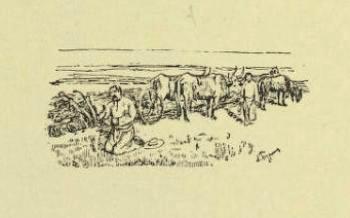
|
VIII
Now Mark comes on with the caravan
Singing blithely as he can.
To the inns he makes no speed.
Quietly lets the oxen feed.
Mark brings home for Katherine
Precious cloth of substance rich;
For father dear, a girdle sewn
Of silk so red.
For Servant Anne
a gold cloth bonnet
To deck her head,
And kerchief, too
with white lace on it.
For the children are shoes
with figs and grapes.
There’s gifts for all,
there's none escapes.
For all he brings
red wine, so fine,
From great old city
of Constantine —
There’s buckets three
in each barrel put on,
And caviar
from the river Don.
Such gifts he has
in his wagon there,
Nor knows the sorrow
his loved ones bear.
On comes Mark,
knows not of worry;
But he’s come
Give God the glory!
The gate he opens,
Praising God.
“Hear’st thou, Katherine?
Run to meet him!
Already he’s come,
Haste to greet him!
Quickly bring him in to me.
Glory to Thee, my Saviour dear,
All the strength has come from Thee.”
And she “Our Father” softlv said.
Just as if in dream she read.
The old man the team unyokes,
Lays away the carven yokes.
Kate at her husband strangely looks.
“Where’s Anna, Katherine?
I’ve been careless!
She’s not dead?”
“No, not dead.
But very sick and calls for thee.”
On the threshold Mark appears.
Standing there as torn by fears.
But Anna whispers, “Be not afraid,
Glory to God. Who my fears allayed.
Go forth, Katherine,
though I love you well,
I’ve something to ask him,
something to tell.”
From the place
fair Katherine went;
While Mark his head
o’er the Servant bent.
“Mark, look at me.
Look at me well!
A secret now I have to tell.
On this faded form
set no longer store,
No servant, I, nor Anna more,
I am — ... ”
Came silence dumb,
Nor vet guessed Mark
What was to come.
Yet once again her eyelids raised
Into his eyes she deeply gazed
’Mid gathering tears.
“I from thee forgiveness pray;
I’ve penance offered day by day
All my life to serve another.
Forgive me, son, of me,
For I — am thy mother.”
She ceased to speak.
A sudden faintness
Mark did take:
It seemed the earth
itself did shake.
He roused —
and to his mother crept,
But the mother
forever slept.
|
|
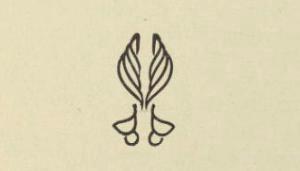
Taras Shevchenko, poem "Naimechka or The Servant"
"Naymychka" (Наймичка"), поема
("U nedilyu vrantsi-rano pole vkrylosya tumanom..." /
"У неділю вранці-рано поле вкрилося туманом...")
Pereyaslav, November 13, 1845.
Translated by Alexander Jardine Hunter
Source of English translation of the poem: "The Kobzar of the Ukraine". Being select Poems of Taras Shevchenko. Done into English Verse with Biographical Fragments by Alexander Jardine Hunter, p. 39 - 66.
Source of the illustrations - the same book.
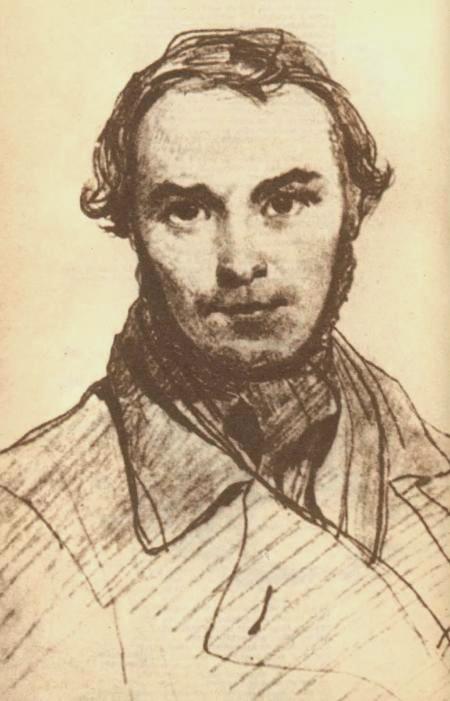
Taras Shevchenko. Self-Portrait. Pencil. 1845.
Original publication:
Taras Shevchenko. Zibrannia tvoriv: U 6 t. — K., 2003. — T. 1:
Poeziia 1837-1847. — S. 329 - 342, 730 - 730.
|
Тарас Шевченко
НАЙМИЧКА
Поема
Пролог
У неділю вранці-рано
Поле вкрилося туманом.
У тумані на могилі,
Як тополя, похилилась
Молодиця молодая.
Щось до лона пригортає
Та з туманом розмовляє:
— Ой, тумане, тумане,
Мій латаний талане!
Чому мене не сховаєш
Отут серед лану?
Чому мене не задавиш,
У землю не вдавиш?
Чому мені злої долі,
Чом віку не збавиш?
Ні, не дави, туманочку!
Сховай тільки в полі,
Щоб ніхто не знав, не бачив
Моєї недолі!..
Я не одна: єсть у мене
І батько і мати...
Єсть у мене... туманочку,
Туманочку, брате!!.
Дитя моє, мій синочку,
Нехрещений сину!
Не я тебе хреститиму
На лиху годину.
Чужі люди хреститимуть,
Я не буду знати,
Як і зовуть... Дитя моє!
Я була багата...
Не лай мене! Молитимусь,
Із самого неба
Долю виплачу сльозами
І пошлю до тебе! —
Пішла полем, ридаючи,
В тумані ховалась
Та крізь сльози тихесенько
Про вдову співала,
Як удова в Дунаєві
Синів поховала:
«Ой у полі могила;
Там удова ходила, —
Там ходила, гуляла,
Трути-зілля шукала.
Трути-зілля не найшла,
Та синів двох привела,
В китаєчку повила
І на Дунай однесла:
— Тихий, тихий Дунай!
Моїх діток забавляй.
Ти, жовтесенький пісок,
Нагодуй моїх діток!
І скупай, і сповий,
І собою укрий!»
І
Був собі дід та баба.
З давнього давна, у гаї над ставом
Удвох собі на хуторі жили,
Як діточок двоє,
Усюди обоє.
Ще змалечку удвох ягнята пасли,
А потім побрали'ся,
Худоби діждалися, —
Придбали хутір, став і млин.
Садок у гаї розвели
І пасіку чималу —
Всього надбали.
Та діточок у їх бігма,
А смерть з косою за плечима.
Хто ж їх старість привітає,
За дитину стане?
Хто заплаче, поховає,
Хто душу спом'яне?
Хто поживе добро чесно
В добрую годину
І згадає, дякуючи,
Як своя дитина?..
Тяжко дітей годувати
У безверхій хаті,
А ще гірше старітися
У білих палатах,
Старітися, умирати,
Добро покидати
Чужим людям, чужим дітям
На сміх, на розтрату!
II
І дід і баба у неділю
На призьбі вдвох собі сиділи
Гарненько, в білих сорочках.
Сіяло сонце; в небесах
Ані хмариночки; та тихо
Та любо, як у раї.
Сховалося у серці лихо, —
Як звір у темнім гаї.
В такім раї чого б, бачся,
Старим сумувати?
Чи то давнє яке лихо
Прокинулось в хаті?
Чи вчорашнє, задавлене
Знов поворушилось?
Чи ще тільки заклюнулось
І рай запалило?
Не знаю, що і після чого
Старі сумують. Може, вже
Оце збираються до бога,
Та хто в далекую дорогу
Їм добре коней запряже?
— А хто нас, Насте, поховає,
Як помремо? — Сама не знаю!
Я все оце міркувала,
Та аж сумно стало:
Одинокі зостарілись...
Кому понадбали
Добра сього?.. — Стривай лишень!
Чи чуєш? Щось плаче
За ворітьми, мов дитина!
Побіжім лиш... Бачиш —
Я вгадував, що щось буде! —
І разом схопились,
Та до воріт... Прибігають —
Мовчки зупинились.
Перед самим перелазом
Дитина сповита —
Та й не туго й новенькою
Свитиною вкрита.
Бо то мати сповивала —
І літом укрила
Останньою свитиною!..
Дивились, молилис
Старі мої. А сердешне
Неначе благає:
Випручало рученята
Й до їх простягає
Манюсінькі... і замовкло,
Неначе не плаче,
Тільки пхика.
— А що. Насте?
Я й казав... От бачиш!
От і талан, от і доля,
І не одинокі!
Бери ж лишень та сповивай...
Ач, яке, нівроку!
Неси ж в хату, а я верхи
Кинусь за кумами
В Городище... —
Чудно якось
Діється між нами!
Один сина проклинає,
З хати виганяє,
Другий свічечку, сердешний,
Потом заробляє
Та, ридаючи, становить
Перед образами —
Нема дітей!.. Чудно якось
Діється між нами!
III
Аж три пари на радощах
Кумів назбирали
Та ввечері й охрестили,
І Марком назвали.
Росте Марко; старі мої
Не знають, де діти,
Де посадить, де положить
І що з ним робити.
Минає рік. Росте Марко —
І дійна корова
У розкоші купається.
Аж ось чорноброва
Та молода, білолиця
Прийшла молодиця
На той хутір благодатний
У найми проситься.
— А що ж, каже, возьмім, Насте!
— Возьмімо, Трохиме,
Бо ми старі, нездужаєм,
Та таки й дитина.
Хоч воно вже й підросло,
Та все ж таки треба
Коло його піклуватись.
— Та воно-то треба,
Бо я й свою вже часточку
Прожив, слава богу, —
Підтоптався. Так що ж тепер,
Що візьмеш, небого?
За рік, чи як? — А що дасте.
— Е, ні! Треба знати,
Треба, дочко, лічить плату,
Зароблену плату.
Бо сказано: хто не лічить,
То той і не має.
Так отак хіба, небого:
Ні ти нас не знаєш,
Ні ми тебе; а поживеш,
Роздивишся в хаті,
Та й ми тебе побачимо —
Отоді й за плату.
Чи так, дочко? — Добре, дядьку.
— Просимо ж у хату. —
Поєднались. Молодиця
Рада та весела;
Ніби з паном повінчалась,
Закупила села!
І у хаті, і на дворі,
І коло скотини —
Увечері, і вдосвіта;
А коло дитини —
Так і пада, ніби мати,
В будень і в неділю
Головоньку йому змиє
Й сорочечку білу
Що день божий, надіває;
Грається співає,
Робить возики; а в свято —
То й з рук не спускає.
Дивуються старі мої
Та моляться богу...
А наймичка невсипуща
Щовечір, небога,
Свою долю проклинає,
Тяжко, важко плаче;
І ніхто того не чує,
Незнає й не бачить,
Опріч Марка маленького.
Так воно не знає,
Чого наймичка сльозами
Його умиває.
Не зна Марко, чого вона
Так його цілує,
Сама не з'їсть і не доп'є —
Його нагодує.
Не зна Марко. Як в колисці
Часом серед ночі
Прокинеться, ворухнеться, —
То вона вже скочить,
І укриє, й перехрестить,
Тихо заколише —
Вона чує з тії хати,
Як дитина дише.
Вранці Марко до наймички
Ручки простягає
І мамою невсипущу
Ганну величає...
Не зна Марко. Росте собі,
Росте, виростає.
IV
Чимало літ перевернулось,
Води чимало утекло.
І в хутір лихо завернуло,
І сльоз чимало принесло.
Бабусю Настю поховали
І ледве, ледве одволали
Трохима діда. Прогуло
Прокляте лихо та й заснуло —
На хутір знову благодать
З-за гаю темного вернулась
До діда в хату спочивать.
Уже Марко чумакує
І восени не почує
Ні під хатою, ні в хаті, —
Кого-небудь треба сватать!
— Кого ж би тут? — старий дума
І просить поради
У наймички. А наймичка
До царівни б рада
Слать старости: — Треба Марка
Самого спитати.
— Добре, дочко, спитаємо
Та й будемо сватать. —
Розпитали, порадились,
Та й за старостами
Пішов Марко. Вернулися
Люди з рушниками,
З святим хлібом обміненим.
Панну у жупані,
Таку кралю висватали,
Що хоч за гетьмана,
То не сором. Отаке-то
Диво запопали.
— Спасибі вам! — старий каже. —
Тепер, щоб ви знали,
Треба краю доводити,
Коли й де вінчати,
Та й весілля. Та ще ось що:
Хто в нас буде мати?
Не дожила моя Настя!.. —
Та й заливсь сльозами.
А наймичка у порогу
Вхопилась руками
За одвірок та й зомліла.
Тихо стало в хаті;
Тільки наймичка шептала:
— Мати... мати... мати...
V
Через тиждень молодиці
Коровай місили
На хуторі. Старий батько
З усієї сили
З молодицями танцює,
Та двір вимітає,
Та прохожих, проїжджачих
У двір закликає,
Та вареною частує,
На весілля просить.
Знай бігає — а самого
Ледве ноги носять.
Скрізь гармидер та реготня,
В хаті і надворі.
І жолоби викотили
З нової комори.
Скрізь порання: печуть, варять,
Вимітають, миють...
Та все чужі. Де ж наймичка?
На прощу у Київ
Пішла Ганна. Благав старий,
А Марко аж плакав,
Щоб була вона за матір.
— Ні, Марку! Ніяко
Мені матір'ю сидіти:
То багаті люди,
А я наймичка... Ще й з тебе
Сміятися будуть. —
Нехай бог вам помагає!
Піду помолюся.
Усім святим у Києві,
Та й знову вернуся
В вашу хату, як приймете.
Поки маю сили,
Трудитимусь... — Чистим серцем
Поблагословила
Свого Марка... Заплакала
Й пішла за ворота.
Розвернулося весілля,
Музикам робота —
І підковам. Вареною
Столи й лави миють.
А наймичка шкандибає,
Поспішає в Київ.
Прийшла в Київ — не спочила,
У міщанки стала,
Найнялася носить воду,
Бо грошей нестало
На молебствіє Варварі.
Носила, носила,
Кіп із вісім заробила
Й Маркові купила
Святу шапочку в пещерах
У Йвана святого,
Щоб голова не боліла
В Марка молодого.
І перстеник у Варвари
Невістці достала,
І, всім святим поклонившись,
Додому верталась.
Вернулася. Катерина
І Марко зустріли
За ворітьми, ввели в хату
Й за стіл посадили;
Напували й годували,
Про Київ питали,
І в кімнаті Катерина
Одпочить послала.
— За що вони мене люблять?
За що поважають?
О боже мій милосердний,
Може, вони знають...
Може, вони догадались...
Ні, не догадались —
Вони добрі... — І наймичка
Тяжко заридала.
VI
Тричі крига замерзала,
Тричі розтавала,
Тричі наймичку у Київ
Катря провожала,
Так, як матір. І в четвертий
Провела небогу
Аж у поле, до могили,
І молила бога,
Щоб швиденько верталася,
Бо без неї в хаті
Якось сумно — ніби мати
Покинула хату.
Після пречистої в неділю,
Та після першої, Трохим
Старий сидів в сорочці білій,
В брилі, на призьбі. Перед ним
З собакою онучок грався,
А внучка в юпку одяглась
У Катрину і ніби йшла
До діда в гості. Засміявсь
Старий і внучку привітав,
Неначе справді молодицю:
— А де ж ти діла паляницю?
Чи, може, в лісі хто одняв?
Чи попросту — забула взяти?
Чи, може, ще й не напекла?
Е, сором, сором! Лепська мати! —
Аж зирк — і наймичка ввійшла
На двір. Старий побіг стрічати
З онуками свою Ганну...
— А Марко в дорозі? —
Ганна діда питалася.
— В дорозі ще й досі.
— А я ледве додибала
До вашої хати,
Не хотілось на чужині
Одній умирати.
Коли б Марка діждатися...
Так щось тяжко стало! —
І внучатам із клуночка
Гостинці виймала —
І хрестики, й дукачики,
Й намиста разочок
Яриночці, і червоний
З фольги образочок,
А Карпові соловейка
Та коників пару,
І четвертий уже перстень
Святої Варвари
Катерині. А дідові
Із воску святого
Три свічечки; а Маркові
І собі нічого
Не принесла, не купила,
Бо грошей нестало,
А заробить не здужала.
— А ось ще осталось
Півбубличка! — Й по шматочку
Дітям розділила.
VII
Ввійшла в хату. Катерина
Їй ноги умила
Й полуднувать посадила.
Не пила й не їла
Стара Ганна. — Катерино!
Коли в нас неділя? —
— Післязавтра. — Треба буде
Акафіст найняти
Миколаєві святому
Й на часточку дати;
Бо щось Марко забарився...
Може, де в дорозі
Занедужав, сохрань боже! —
Й покапали сльози
З старих очей замучених,
Ледве, ледве встала
Із-за стола. — Катерино!
Не та вже я стала:
Зледащіла, не здужаю
І на ноги встати.
Тяжко, Катре, умирати
В чужій теплій хаті.
Занедужала небога.
Уже й причащали,
Й малосвятіє служили, —
Ні, не помагало!
Старий Трохим по надвір'ю,
Мов убитий, ходить.
Катерина ж з болящої
І очей не зводить.
Катерина коло неї
І днює й ночує.
А тимчасом сичі вночі
Недобре віщують —
На коморі. Болящая
Щодень, що година
Ледве чути питається:
— Доню Катерино!
Чи ще Марко не приїхав?
Ох, якби я знала,
Що діждуся, що побачу,
То ще б підождала.
VIII
Іде Марко з чумаками;
Ідучи співає.
Не поспіша до господи —
Воли попасає.
Везе Марко Катерині
Сукна дорогого,
"А батькові шитий пояс
Шовку червоного.
А наймичці на очіпок
Парчі золотої
І червону добру хустку
З білою габою.
А діточкам черевички,
Фіг та винограду.
А всім вкупі — червоного
Вина з Цареграду
Відер з троє у барилі,
І кав'яру з Дону, —
Всього везе, та не знає,
Що діється дома.
Іде Марко, не журиться.
Прийшов — слава богу!
І ворота одчиняє,
І молиться богу...
— Чи чуєш ти, Катерино?
Біжи зустрічати!
Уже прийшов. Біжи швидше,
Швидше веди в хату!..
Слава тобі, Христе боже!
Насилу діждала! —
І «отче наш» тихо... тихо,
Мов крізь сон, читала.
Старий воли випрягає,
Занози ховає
Мережані. А Катруся
Марка оглядає.
— А де ж Ганна, Катерино?
Я пак і байдуже.
Чи не вмерла? — Ні, не вмерла,
А дуже нездужа.
Ходім лишень в малу хату,
Поки випрягає
Воли батько; вона тебе,
Марку, дожидає. —
Ввійшов Марко в малу хату
І став у порогу...
Аж злякався. Ганна шепче:
— Слава... слава богу.
Ходи сюди, не лякайся...
Вийди, Катре, з хати:
Я щось маю розпитати,
Дещо розказати. — .
Вийшла з хати Катерина,
А Марко схилився
До наймички у голови.
— Марку! Подивися,
Подивися ти на мене!
Бач, як я змарніла.
Я не Ганна, не наймичка,
Я... — Та й оніміла.
Марко плакав, дивувався.
Знов очі одкрила,
Пильно, пильно подивилась —
Сльози покотились.
— Прости мене. Я каралась
Весь вік в чужій хаті...
Прости мене, мій синочку!
Я... я твоя мати. —
Та й замовкла... Зомлів Марко,
Й земля задрижала.
Прокинувся... до матері —
А мати вже спала.
(1845, Переяслав)
|
|
За матеріалами: Тарас Шевченко. Зібрання творів у 6 томах. Київ, "Наукова думка", 2003. Том 1: Поезія 1837 - 1847, стор. 329 - 342, 730 - 733.
Read more:
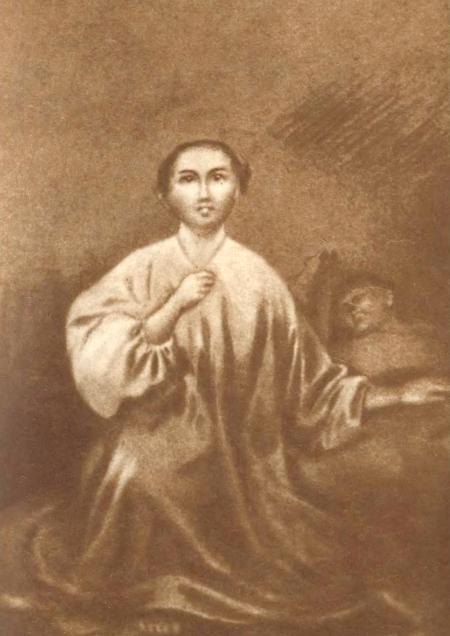 Taras Shevchenko, poem "The Housemaid" Taras Shevchenko, poem "The Housemaid"
"Naymychka" (Наймичка"), поема
("U nedilyu vrantsi-rano pole vkrylosya tumanom..." /
"У неділю вранці-рано поле вкрилося туманом...")
Pereyaslav, November 13, 1845.
Translated by Olga Shartse
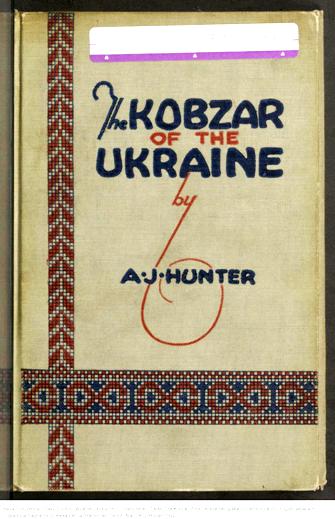 "The Kobzar of the Ukraine". Being select Poems of Taras Shevchenko. Done into English Verse with Biographical Fragments by Alexander Jardine Hunter. "The Kobzar of the Ukraine". Being select Poems of Taras Shevchenko. Done into English Verse with Biographical Fragments by Alexander Jardine Hunter.
Споріднені публікації, за тегами:
|
|
|
|
|
|












